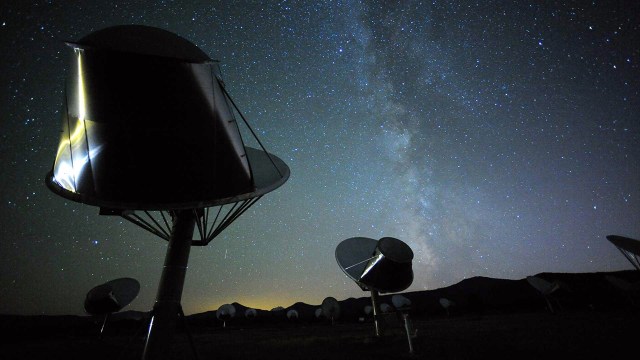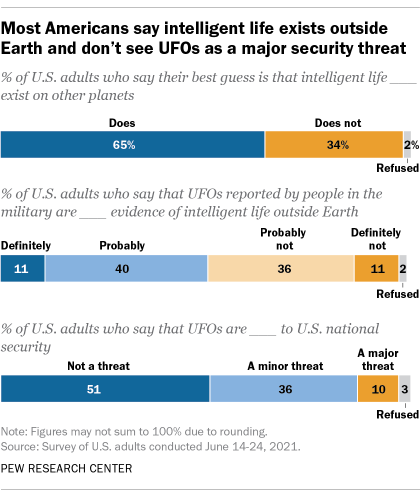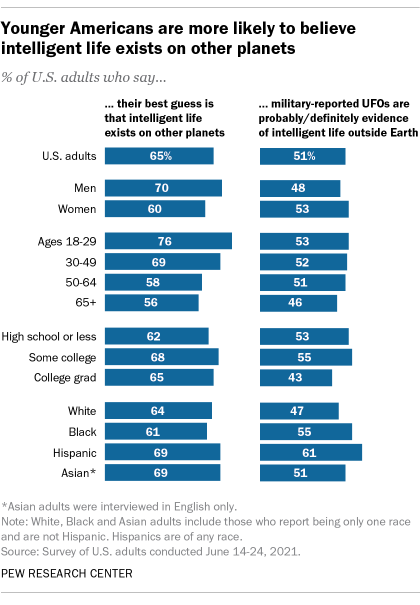
As an unprecedented U.S. intelligence report brings new attention to the phenomenon of unidentified flying objects, about two-thirds of Americans (65%) say their best guess is that intelligent life exists on other planets, according to a Pew Research Center survey conducted just before the release of the government assessment.
A smaller but still sizable share of the public (51%) says that UFOs reported by people in the military are likely evidence of intelligent life outside Earth. Most of this sentiment comes from people who say that military-reported UFOs are “probably” evidence of extraterrestrial life (40%), rather than “definitely” such evidence (11%), according to the survey of 10,417 U.S. adults, conducted June 14 to 24. On the other hand, 47% of Americans say the military reports are probably (36%) or definitely (11%) not evidence of life outside Earth.
Perhaps not surprisingly, those who think there is intelligent life outside Earth are more inclined than others to see military reports of UFOs as evidence (69% and 16%, respectively).
These findings are from a recent Pew Research Center study conducted to understand Americans’ views on a range of issues. We surveyed 10,417 U.S. adults between June 14 and 24, 2021. Everyone who took part is a member of the Center’s American Trends Panel (ATP), an online survey panel that is recruited through national, random sampling of residential addresses. This way nearly all U.S. adults have a chance of selection. The survey is weighted to be representative of the U.S. adult population by gender, race, ethnicity, partisan affiliation, education and other categories. Read more about the ATP’s methodology.
Here are the questions used for this report, along with responses, and its methodology.
By and large, the public does not view UFOs as a major threat to the country. When asked to think about U.S. national security, most Americans (87%) say that UFOs are not a threat at all (51%) or a minor threat (36%). One-in-ten say UFOs are a major threat to U.S. national security.
In general, Americans are not inclined to assume that UFOs are hostile. When asked for another best guess, 17% say UFOs are friendly, 7% say they are unfriendly and 74% said they are neither. This pattern holds when looking only at adults who say that UFOs reported by people in the military are probably or definitely evidence of intelligent life outside Earth. Among the 51% of U.S. adults who say that military-reported UFOs are at least probably evidence of intelligent life outside Earth, 26% say UFOs are friendly, 7% say they are unfriendly and 65% say neither.
Some segments of the public are more likely than others to believe that intelligent life exists on other planets. This view is especially pronounced among younger Americans. About three-quarters (76%) of adults under age 30 say intelligent life exists on other planets, versus 57% of those 50 and older.
Men are more likely than women to believe in extraterrestrial life (70% vs. 60%). However, men are not more likely than women to believe that the military-reported UFOs are probably or definitely evidence of intelligent life outside Earth. White adults and those who are college-educated tend to be more skeptical than others over the possibility that military-reported UFOs are evidence of extraterrestrial life.
While the intelligence report has received prominent media coverage, Americans were broadly unaware of the assessment prior to its release. Most Americans (87%) said they had heard or read a little (66%) or nothing at all (21%) about the government releasing information about UFO sightings, compared with just 12% who said they had heard or read a lot about it.
The 12% of adults who said they were following the developments most closely are particularly inclined to believe in intelligent life outside Earth (80%) and to believe that military-reported UFOs are at least probably evidence of such life (65%). This group is also slightly more likely to consider UFOs a major national security threat than other adults (17% vs. 9%).
From the survey alone, it is not possible to determine whether recent government information itself is making people more likely to believe the UFO reports are evidence of extraterrestrial life, or whether Americans who were already inclined to believe this tend to be among those following the story most closely.
When asked to evaluate the federal government’s handling of the reports of UFO sightings, the balance of public opinion is slightly negative. About half of Americans (49%) say the federal government is doing a very or somewhat bad job dealing with reports of UFO sightings, while 45% say the government is doing a very or somewhat good job.
Those who said they had heard or read a lot about the government releasing information on UFO sightings are more likely to feel the government is doing a bad job (60%) than those who said they had heard a little or nothing at all about the release (47%). Similarly, those who believe that military-reported UFO sightings are probably or definitely evidence of extraterrestrial life are more critical of the government’s handling of the issue (54% of this group say it has done a bad job) than those who do not believe the sightings are evidence of such life (44% of whom say the government has done a bad job).
Note: Here are the questions used for this report, along with responses, and its methodology.


